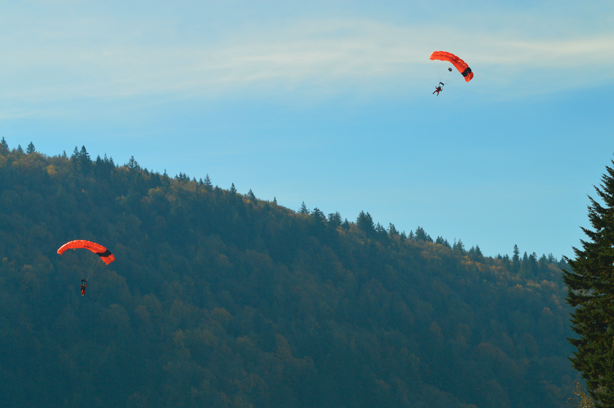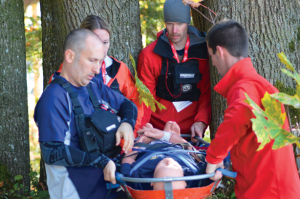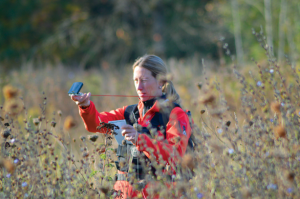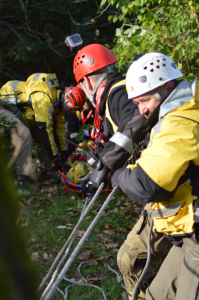Print Edition: October 23, 2013

Behind Chilliwack’s UFV campus was a sight that required some context to be believed. Several people were running around carrying dummies, others were making fires in the forest, and still others were walking around holding up compasses despite being in a field. In truth, these were members of BC’s Search and Rescue teams carrying out challenges for SARscene 2013!
This event is a congregation of Search and Rescue teams from across the province. Teams are presented with six different challenges to test their skills and their efficiency. Hosted by the British Columbia Search and Rescue Association and National Search and Rescue Secretariat, the games haven’t been held in BC since the Coquitlam team placed first in Victoria in 2007.
[pullquote]“Despite where [teams] are from, they still train the same way, which is what helps us all communicate in the time of crisis…”[/pullquote]
Along with the competition, the Games feature a trade show with different equipment and technology companies showcasing state-of-the-art products for Search and Rescue teams to acquire. Afterward there were conferences where delegates from around the world discussed new issues and ideas. Search and Rescue in BC is very prominent, with more calls in the province than in the rest of the country combined. With Chilliwack receiving 80 calls last year alone, these games showcase how BC’s crews provide the best possible emergency response.

The games consisted of challenges that included slope evacuation, ground search and rescue, medical procedure, and navigation/orientation. Unlike most extreme challenges, the teams did not run or rush through a challenge. The whole point of the games is for the teams to perform correctly, safely, and with perfect coordination.

The judge of the low angle slope challenge stated that the trial was about melding as a team, and having a strong leader form a solid plan. Setting up a stretcher basket properly and creating a strong rope pulley system to transport the victim took the Central Fraser Valley team over 20 minutes to complete, but afterward, the judge complemented them on their stretcher basket weaving and their time. He also pointed out to them things they could improve. The friendly environment helps encourage team-building and healthy competition.
The team-building challenge also requires coordination of trust and leadership. In this exercise, the team’s leader had to search a grid for teammates while blindfolded and mute, which proved to be quite a challenge.
Later, the Coquitlam team performed very well in the ground search and rescue challenges, hitting the target with the rope grip harness almost dead on and safely transporting a dummy victim through an obstacle course.
Shaking, loud cries, and painful moans helped build the scenario for the Vernon team as they performed medical procedures and checked the ABCs: airwaves, breathing, and circulation. The team checked an alleged bear attack victim over for cuts and bleeding as well as injured limbs while providing emotional care. The girl’s acting was so good, she almost had some of the spectators convinced.

Another interesting test was the condition challenge. The teams were tasked with creating a fire with flint and twigs while building a decent shelter from tarp and ropes. Once the fire was lit, they had to boil a pot of water within five minutes!
“Despite where [teams] are from, they still train the same way, which is what helps us all communicate in the time of crisis,” BC Search and Rescue Association vice president Colin Wiebe stated. Wiebe said the games are a means of critiquing and improving skills as well as displaying them.
After the challenges were complete and the scores tallied, it was a tight victory for Nelson’s team, followed by Prince George and Coquitlam, all only separated by three points.
The Search and Rescue Games are a friendly competition that truly inspires camaraderie in these groups not only to perform well, but also learn from their regional partners in the field. With skiing and snowboarding season approaching, our SAR teams need all the training they can get.


